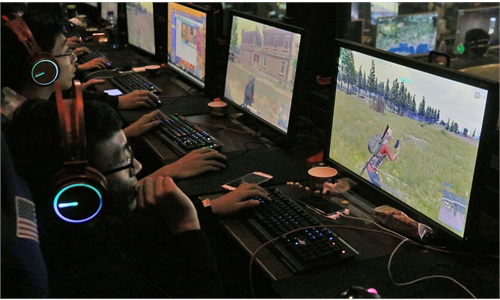Stock prices of Tencent, other gaming companies dive after blasted by a national newspaper

A player plays an online game in Jinhua, East China's Zhejiang Province. Photo: IC
Share prices of Chinese online gaming companies tumbled on Tuesday, after a report by the Economic Information Daily, affiliated to Xinhua News Agency, asserted that online games are "spiritual opium", and their impact on teenagers' health should not be underestimated.The commentary, though later removed from the newspaper's official website and replaced by a new edited version, reportedly dealt a blow to Chinese online gaming companies on the stock market but pleased Chinese parents.
On Tuesday, shares of Chinese gaming giant Tencent Holdings tumbled by 6.11 percent to close at HK$446.00 ($57.36) at Hong Kong stock exchange. Gaming companies NetEase Inc fell 7.77 percent to close at HK$145.90 and XD Inc fell 8.12 percent to end at HK$55.15.
In the A-share market, Wuhu 37 Interactive Entertainment Network Technology Group Co slid 5.61 percent, Perfect World Co was down 5.29 percent and Zhejiang Century Huatong Group Co fell 5.26 percent.
On Tuesday, the Economic Information Daily reported that addiction to online games has negative impact on teenagers' physiology and psychology. It pointed out that more than half of the country's children and teenagers suffered from near-sightedness in 2020, and addiction to online games affected their academic performance and led to development of personality disorders.
The news article said that "the harm of online games" is increasingly becoming a social consensus, with the industry being dubbed as "spiritual opium" or "electronic drug". But these phrases were later deleted in the updated and edited version titled Online Games Grow into Industry with Hundred Billion [Yuan].
The article on Tuesday has won support from some Chinese parents.
"[The online gaming sector] should have been regulated earlier. Look at the children in the countryside. Even if they have one day off, they will spend it playing online games, whether they're in primary, junior high or senior high school," a Weibo user said on Tuesday.
"I am for tougher regulations. My brother dropped out after he was addicted to online games. He used to be a very good student in school," another Weibo user said.
Online gaming has grown into a massive industry. In 2020, gaming sales in China grew 20.71 percent year-on-year to reach 278.7 billion yuan ($43.1 billion).
Tencent - which accounts for about half of the market - posted income of 156.1 billion yuan.
Tencent on Tuesday replied that it will introduce new tech safeguards to limit online playing time of minors under 12 years old - from original 90 minutes to 1 hour per day on school days, and from 3 hours to 2 hours on weekends and holidays. The company also vowed to inspect, at any time, any user who is a minor but is pretending to be an adult.
According to the report by the Economic Information Daily, a survey conducted at a middle school in Luzhou, Southwest China's Sichuan Province, about students' addiction to online games showed that 26.23 percent of 2,000 respondents played online games every two or three days, while 11.66 played every day.
Honor of Kings, developed by Tencent, is the most popular mobile game among the surveyed students, with 47.6 percent playing the game frequently. It is also one of the most popular mobile games among Chinese young and adult gamers.
At the China Digital Entertainment Expo and Conference, or ChinaJoy, Yang Fang, vice-director of the Publishing Bureau of the Central Publicity Department said on July 29 that the country has established a national online game anti-addiction real-name authentication system, with over 5,000 enterprises and 10,000 games set to be connected.
Yang said that relevant government agencies will continue to focus on anti-addiction work.
Regarding market sentiment in the wake of China's tough regulation of the platform economy and private education sector, TF Securities reassured investors, by saying there is no need for the market to panic.
Regulatory moves targeting the platform economy or after-school tutoring were aimed at fostering healthy development of the concerned industries. According to Xinhua, the measures are designed to safeguard cybersecurity and social well-being, and definitely not a crackdown. On the contrary, they aim for economic and social development over the long term.
Liu Dingding, a Beijing-based independent tech analyst, said the Economic Information Daily's article does not signal China's crackdown on its burgeoning gaming sector. "All of the moves aim to build a healthy and safe cyber environment for Chinese users," he told the Global Times.
In addition, as an indispensible part of the cultural industry, gaming is connected to many sectors, including cloud computing, big data, literature, IP, animation and music, according to Liu, and the industry has promising development prospects.
Addiction to online games by children is not only a problem for game developers, Chu Zhaohui, a research fellow at the National Institute of Education Sciences, told the Global Times. "Our educational system should develop personal autonomy for children so that they can make choices by themselves," the educational expert suggested.




